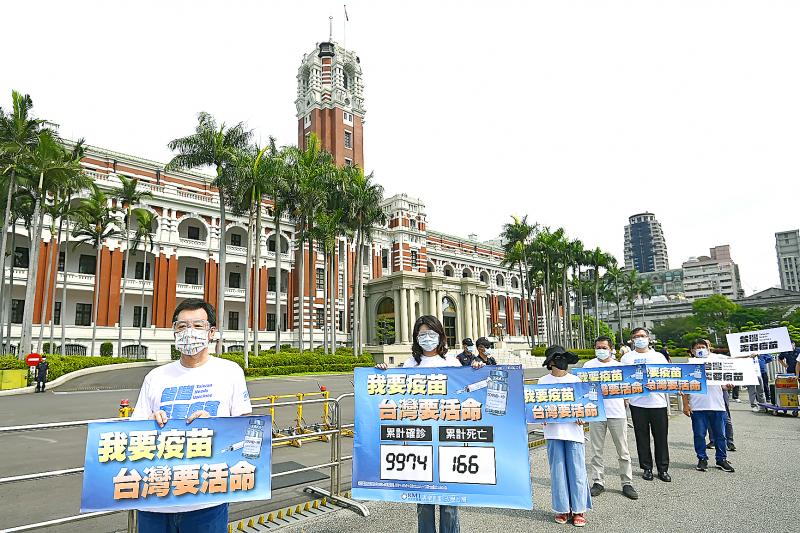The Chinese Nationalist Party (KMT) yesterday called on the public to launch nationwide protests against the government’s COVID-19 vaccine policy tomorrow.
People should protest at home by taking photographs of themselves holding up signs with the slogan “support healthcare workers, we want vaccines” and post them on Facebook under a hashtag for the protest.
Earlier yesterday, the KMT said that people should protest “wherever they are,” suggesting that people make noise in front of open windows at home, bang pots and pans, and turn off their lights for one minute at 8pm, as well as that people who are traveling in their vehicles should honk their horns.

Photo: Chen Chih-chu, Taipei Times
After medical workers said that this might disrupt their work, the KMT changed its protest call.
KMT Disciplinary Committee director Yeh Ching-yuan (葉慶元) in an online news conference accused the Ministry of Health and Welfare of contravening the law by demanding that Honhai Precision Industry Co (鴻海精密) founder Terry Gou (郭台銘) submit letters from BioNTech as part of his application to import COVID-19 vaccines from the German manufacturer.
The YongLin Charity and Education Foundation, a charity established by Gou, on Tuesday submitted its application for the importation of 5 million doses of the vaccine to the Food and Drug Administration.
Minister of Health and Welfare Chen Shih-chung (陳時中), who heads the Central Epidemic Command Center (CECC), on Thursday said that the foundation would additionally have to submit an original letter of authorization from the manufacturer.
Citing the Regulations for Approval of Specific Medical Products’ Manufacturing or Importing as a Special Case (特定藥物專案核准輸入及製造辦法), Yeh said that there is no legal requirement for the additional documentation or any other proof that a drug intended for import is available.
Requirements cited by the ministry cannot be found on its Web site, Yeh added.
In contrast with other entities, the CECC could import drugs and file the required paperwork up to half a year later, Yeh said, citing Article 51 of the Communicable Disease Control Act (傳染病防治法).
“All this talk of paperwork … is bogus,” Yeh said.
Chen is misinterpreting the law and making up requirements to prevent the importation of vaccines, he added.
KMT Chairman Johnny Chiang (江啟臣) said that even with Japan’s donation of 1.24 million doses of the AstraZeneca COVID-19 vaccine yesterday, Taiwan still needs more vaccines.
If Taiwan “opens its doors,” it would be able to obtain more vaccines quickly, Chiang said.
The donation from Japan shows that the administration of President Tsai Ing-wen (蔡英文) needs help to obtain doses from the private sector, the public and the international community, Chiang said, adding that the government’s planning on vaccine purchases is disorganized and has evidently failed.
The government has said that it stands with the people, and now it is time to live up to its words instead of blocking the importation of vaccines, citing “vaccine safety,” he said.
Taiwanese can “only shake their heads” in dismay over the government’s performance while people in the private sector are seeking ways to purchase vaccines, he said.
Separately, Democratic Progressive Party caucus secretary-general Lo Chih-cheng (羅致政) yesterday said that KMT lawmakers should “do their job in the legislature” instead of staging a protest under the “we want vaccines” banner in front of the Presidential Office Building in Taipei earlier that day.
Additional reporting by Jason Pan and CNA

Three Taiwanese airlines have prohibited passengers from packing Bluetooth earbuds and their charger cases in checked luggage. EVA Air and Uni Air said that Bluetooth earbuds and charger cases are categorized as portable electronic devices, which should be switched off if they are placed in checked luggage based on international aviation safety regulations. They must not be in standby or sleep mode. However, as charging would continue when earbuds are placed in the charger cases, which would contravene international aviation regulations, their cases must be carried as hand luggage, they said. Tigerair Taiwan said that earbud charger cases are equipped

Foreign travelers entering Taiwan on a short layover via Taiwan Taoyuan International Airport are receiving NT$600 gift vouchers from yesterday, the Tourism Administration said, adding that it hopes the incentive would boost tourism consumption at the airport. The program, which allows travelers holding non-Taiwan passports who enter the country during a layover of up to 24 hours to claim a voucher, aims to promote attractions at the airport, the agency said in a statement on Friday. To participate, travelers must sign up on the campaign Web site, the agency said. They can then present their passport and boarding pass for their connecting international

UNILATERAL MOVES: Officials have raised concerns that Beijing could try to exert economic control over Kinmen in a key development plan next year The Civil Aviation Administration (CAA) yesterday said that China has so far failed to provide any information about a new airport expected to open next year that is less than 10km from a Taiwanese airport, raising flight safety concerns. Xiamen Xiangan International Airport is only about 3km at its closest point from the islands in Kinmen County — the scene of on-off fighting during the Cold War — and construction work can be seen and heard clearly from the Taiwan side. In a written statement sent to Reuters, the CAA said that airports close to each other need detailed advanced

The age requirement for commercial pilots and airline transport pilots is to be lowered by two years, to 18 and 21 years respectively, to expand the pool of pilots in accordance with international standards, the Ministry of Transportation and Communications announced today. The changes are part of amendments to articles 93, 119 and 121 of the Regulations Governing Licenses and Ratings for Airmen (航空人員檢定給證管理規則). The amendments take into account age requirements for aviation personnel certification in the Convention on International Civil Aviation and EU’s aviation safety regulations, as well as the practical needs of managing aviation personnel licensing, the ministry said. The ministry